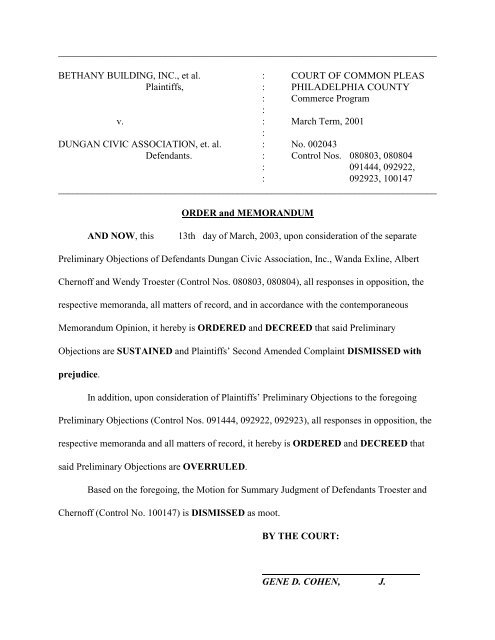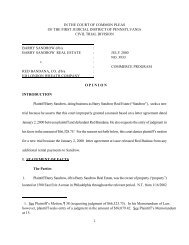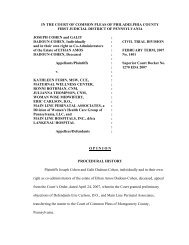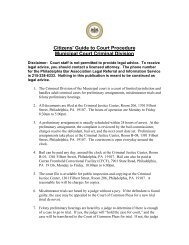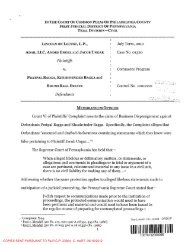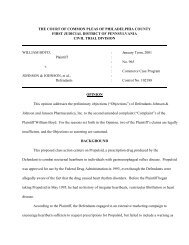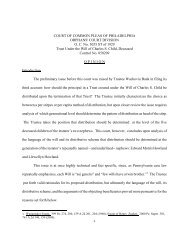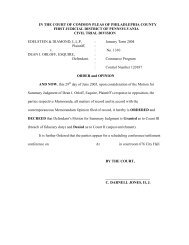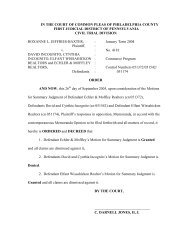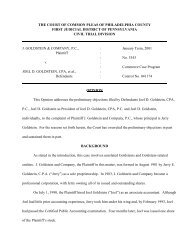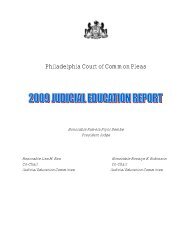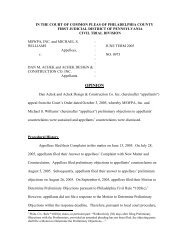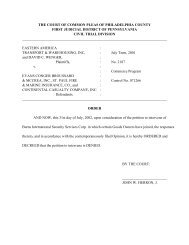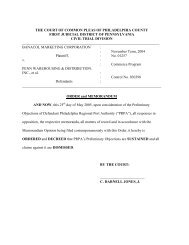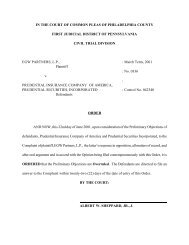BETHANY BUILDING, INC., et al. - The Philadelphia Courts
BETHANY BUILDING, INC., et al. - The Philadelphia Courts
BETHANY BUILDING, INC., et al. - The Philadelphia Courts
You also want an ePaper? Increase the reach of your titles
YUMPU automatically turns print PDFs into web optimized ePapers that Google loves.
______________________________________________________________________________<br />
<strong>BETHANY</strong> <strong>BUILDING</strong>, <strong>INC</strong>., <strong>et</strong> <strong>al</strong>. : COURT OF COMMON PLEAS<br />
Plaintiffs, : PHILADELPHIA COUNTY<br />
: Commerce Program<br />
:<br />
v. : March Term, 2001<br />
:<br />
DUNGAN CIVIC ASSOCIATION, <strong>et</strong>. <strong>al</strong>. : No. 002043<br />
Defendants. : Control Nos. 080803, 080804<br />
: 091444, 092922,<br />
: 092923, 100147<br />
______________________________________________________________________________<br />
ORDER and MEMORANDUM<br />
AND NOW, this<br />
13th day of March, 2003, upon consideration of the separate<br />
Preliminary Objections of Defendants Dungan Civic Association, Inc., Wanda Exline, Albert<br />
Chernoff and Wendy Troester (Control Nos. 080803, 080804), <strong>al</strong>l responses in opposition, the<br />
respective memoranda, <strong>al</strong>l matters of record, and in accordance with the contemporaneous<br />
Memorandum Opinion, it hereby is ORDERED and DECREED that said Preliminary<br />
Objections are SUSTAINED and Plaintiffs’ Second Amended Complaint DISMISSED with<br />
prejudice.<br />
In addition, upon consideration of Plaintiffs’ Preliminary Objections to the foregoing<br />
Preliminary Objections (Control Nos. 091444, 092922, 092923), <strong>al</strong>l responses in opposition, the<br />
respective memoranda and <strong>al</strong>l matters of record, it hereby is ORDERED and DECREED that<br />
said Preliminary Objections are OVERRULED.<br />
Based on the foregoing, the Motion for Summary Judgment of Defendants Troester and<br />
Chernoff (Control No. 100147) is DISMISSED as moot.<br />
BY THE COURT:<br />
GENE D. COHEN, J.
______________________________________________________________________________<br />
<strong>BETHANY</strong> <strong>BUILDING</strong>, <strong>INC</strong>., <strong>et</strong> <strong>al</strong>. : COURT OF COMMON PLEAS<br />
Plaintiffs, : PHILADELPHIA COUNTY<br />
: Commerce Program<br />
:<br />
v. : March Term, 2001<br />
:<br />
DUNGAN CIVIC ASSOCIATION, <strong>et</strong>. <strong>al</strong>. : No. 002043<br />
Defendants. : Control Nos. 080803, 080804<br />
: 091444, 092922,<br />
: 092923, 100147<br />
______________________________________________________________________________<br />
MEMORANDUM OPINION<br />
GENE D. COHEN, J.<br />
Before the Court are numerous motions, including the separate Preliminary Objections of<br />
Defendants Dungan Civic Association, Inc. (“Dungan”), Wanda Exline, Albert Chernoff and<br />
Wendy Troester (Control Nos. 080803, 080804), Plaintiffs’ Preliminary Objections to the<br />
foregoing Preliminary Objections (Control Nos. 091444, 092922, 092923) and the Motion for<br />
Summary Judgment of Defendants Troester and Chernoff (Control No. 100147). For the reasons<br />
fully s<strong>et</strong> forth below, Defendants’ Preliminary Objections are sustained, Plaintiffs’ Preliminary<br />
Objections are overruled and Troester and Chernoff’s Motion for Summary Judgment is<br />
dismissed as moot.<br />
BACKGROUND<br />
<strong>The</strong> instant action was brought by Plaintiffs B<strong>et</strong>hany Building, Inc, B<strong>et</strong>hany Land<br />
Development, Inc., Thomas Clauss and Timothy Clauss (collectively “B<strong>et</strong>hany Building”), a<br />
developer of re<strong>al</strong> property, against Defendants, a neighborhood civic association and sever<strong>al</strong> of<br />
its individu<strong>al</strong> members. Plaintiffs’ case centers around Defendants’ opposition to Plaintiffs’<br />
proposed development in the Dungan neighborhood of <strong>Philadelphia</strong>.<br />
2
Plaintiffs’ Second Amended Complaint (the “Complaint”) contains nine counts and<br />
purports to state causes of action for the following: 1) breach of contract (Count I); 2) violation<br />
of 42 U.S.C.A. § 1983 (Count II); 3) violation of the Pennsylvania Municip<strong>al</strong>ities Planning Code<br />
and <strong>Philadelphia</strong> Zoning Code (Count III); 4) regulatory taking (Count IV); 5) “Intention<strong>al</strong><br />
Interference with Contract Due to the Failure of Due Process Without Privilege and In Violation<br />
of the Due Process Rights of Plaintiff” (Counts V-VII); 6) “Creation of an Illeg<strong>al</strong> and<br />
Unconstitution<strong>al</strong> Ex Post Facto Law” (Count VIII); and 7) “Due to the Failure of Due Process<br />
Without Privilege and In Violation of the Due Process Rights of the Plaintiff and the Creation of<br />
an Ex Post Facto Law Interference with Obligations of Contract” (Count IX).<br />
DISCUSSION<br />
<strong>The</strong> Complaint is poorly-drafted, disjointed and at times nearly incomprehensible. Rule<br />
1019 requires that “materi<strong>al</strong> facts on which a cause of action is based...be stated in a concise and<br />
summary form.” Pa.R.C.P. 1019. Contrary to this basic pleading requirement, much of the<br />
seventy-seven page document constitutes little more than a recitation of constitution<strong>al</strong> law<br />
principles that have no bearing on the case at bar. Adding to this confusion, throughout the<br />
Complaint, Plaintiffs refer to certain individu<strong>al</strong>s as “defendants” who do not appear in the<br />
caption of this lawsuit and who, based upon review of the dock<strong>et</strong>, have not been served with the<br />
Complaint. Moreover, each of the counts of the Complaint are stated against “Defendant”,<br />
however in each instance, Plaintiffs have failed to identify to which specific Defendant(s) the<br />
counts are addressed. 1 Thus, for the purposes of the instant motion, this court will treat each<br />
1 Rule 3.1 of the Pennsylvania Rules of Profession<strong>al</strong> Conduct state: “a lawyer sh<strong>al</strong>l not bring...a<br />
proceeding or assert or controvert an issue therein, unless there is a basis for doing so that is not<br />
frivolous, which includes good faith argument for an extension, modification or revers<strong>al</strong> of existing law.”<br />
Pa..R.P.C. 3.1. Plaintiffs’ counsel in the instant matter is w<strong>al</strong>king a fine line b<strong>et</strong>ween that which is<br />
permissible under the Rules and that which constitutes sanctionable conduct. <strong>The</strong> Complaint filed in this<br />
3
count as if it were brought against <strong>al</strong>l Defendants.<br />
However inartfully Plaintiffs’ claims have been pled, this Court does not find that the<br />
Complaint should be stricken for these reasons <strong>al</strong>one. As to the merits of Plaintiffs’ causes of<br />
action vel non, each will be addressed in turn.<br />
A. Plaintiffs’ Claims Are Barred By the First Amendment and the<br />
Noerr-Pennington Doctrine<br />
Defendants argue that this court should dismiss the complaint because the conduct<br />
<strong>al</strong>leged is protected by the First Amendment to the U.S. Constitution and the Noerr-Pennington<br />
doctrine. This court agrees.<br />
Pursuant to the First Amendment, "Congress sh<strong>al</strong>l make no law respecting an<br />
establishment in religion, or prohibiting the free exercise thereof; or abridging the freedom of<br />
speech, or of the press; or of the right of the people peaceably to assemble, and to p<strong>et</strong>ition the<br />
government for the redress of grievances." U.S. Const. amend. I. <strong>The</strong> Noerr-Pennington<br />
doctrine originated with the United States Supreme Court’s decisions in E. R.R. Presidents<br />
Conference v. Noerr Motor Freight, Inc., 365 U.S. 127 (1961) ("Noerr"), and United Mine<br />
Workers v. Pennington, 381 U.S. 657 (1965) ("Pennington"). Under this doctrine, an individu<strong>al</strong><br />
is immune from liability for exercising his or her First Amendment right to p<strong>et</strong>ition the<br />
government. Pennington, 381 U.S. at 669-70; Noerr, 365 U.S. at 137-38. <strong>The</strong> Court made these<br />
rulings in an antitrust context where the defendants engaged in campaigns directed towards<br />
obtaining government<strong>al</strong> action for the purpose of eliminating comp<strong>et</strong>ition in their respective<br />
industries. Id. In Noerr and Pennington, the Court recognized that the "right of p<strong>et</strong>ition is one of<br />
matter appears more like the work of a pro se litigant rather than that of an officer of the court. Clearly,<br />
the interests of judici<strong>al</strong> economy and efficiency would be b<strong>et</strong>ter served if counsel would adhere to the<br />
Pennsylvania Rules of Civil Procedure and other pertinent rules of court, as well as the basic rules of<br />
grammar and composition.<br />
4
the freedoms protected by the Bill of Rights, and we cannot, of course, lightly impute to<br />
Congress an intent to invade these freedoms." Noerr, 365 U.S. at 138. <strong>The</strong> Court held such<br />
immunity existed “regardless of the defendants' motivations” in waging their campaigns, as it<br />
recognized that the right of individu<strong>al</strong>s to p<strong>et</strong>ition the government "cannot properly be made to<br />
depend on their intent in doing so." Id. at 139. 2<br />
<strong>The</strong> sole exception to the Noerr-Pennington doctrine is the "sham exception" under which<br />
a defendant will not be protected if he or she is simply using the p<strong>et</strong>ition process as a means of<br />
harassment. Chantilly Farms Inc. v. West Pileland Twp., 2001 WL 290645 (E.D. Pa. 2001). In<br />
Chantilly, a developer sued the township and groups of individu<strong>al</strong> citizens who opposed the<br />
plaintiff's proposed subdivision of land. Id. <strong>The</strong> plaintiff <strong>al</strong>leged that the private defendants<br />
p<strong>et</strong>itioned members of the board of supervisors of the planning commission and made<br />
representations to these members, in both public and private me<strong>et</strong>ings, which led to the deni<strong>al</strong> of<br />
plaintiff's propos<strong>al</strong>. Id. <strong>The</strong> district court granted defendants' motion to dismiss the claims<br />
against them on the basis of First Amendment immunity and held that, because the individu<strong>al</strong><br />
defendants in Chantilly Farms p<strong>et</strong>itioned their loc<strong>al</strong> government in order to influence policy and<br />
obtain favorable government action, the sham exception did not apply. 3<br />
Id.<br />
<strong>The</strong> same is true of the case at bar. Here, Plaintiffs seek to recover damages against these<br />
Defendants for actions they have taken to influence public bodies concerning their opposition to<br />
2 <strong>The</strong> Noerr-Pennington doctrine has been extended well-beyond the antitrust context. NAACP v.<br />
Claiborne Hardware Co., 458 U.S. 886 (1982) (Noerr-Pennington doctrine extended to a civil conspiracy<br />
claim by white merchants whose businesses were boycotted by the NAACP.); Barnes Found. v. Twp. of<br />
Lower Merion, 242 F.3d 151 (3d Cir. 2001)(applied Noerr-Pennington doctrine to causes of action<br />
arising under feder<strong>al</strong> civil rights laws); Brownsville Golden Age Nursing Home, Inc. v. Wells, 839 F.2d<br />
155 (3d Cir.1988)(held that defendants were immune from conspiracy liability for damages resulting<br />
from inducing offici<strong>al</strong> action which lead to the state revoking plaintiff’s nursing home license).<br />
3 <strong>The</strong> Chantilly court recognized that, under the Noerr-Pennington doctrine, a defendant's motive<br />
for his or her conduct is irrelevant.<br />
5
B<strong>et</strong>hany Builders’ development plans, conduct which clearly is protected under both the First<br />
Amendment and Noerr-Pennington. As aptly stated in Wawa, Inc. v. Alexander J. Litwornia &<br />
Assoc., 54 Pa. D. & C.4th 375 (2001):<br />
<strong>The</strong> ability to p<strong>et</strong>ition government<strong>al</strong> entities, even for a selfish motive, must be protected<br />
if our democracy is to survive. Lawsuits that would stifle this ability must be dismissed<br />
upon their filing or the offending plaintiff will have succeeded in reducing the address of<br />
grievances in the next case, and the next, and the next.<br />
Id. Should Plaintiffs believe that certain municip<strong>al</strong> bodies have inappropriately acted against its<br />
interests, it has other recourse available to it under the law; the instant lawsuit is not the<br />
appropriate means for seeking such redress.<br />
Notwithstanding this court’s conclusion with respect to the leg<strong>al</strong> question of the<br />
applicability of the Noerr-Pennington doctrine to the case at bar, the factu<strong>al</strong> sufficiency vel non<br />
of Plaintiffs’ claims is quite another matter which will be considered separately and which is<br />
fully discussed infra.<br />
B. Plaintiffs’ Breach of Contract Claim (Count I) Fails As A Matter of Law<br />
Count I of the Complaint purports to state a claim against <strong>al</strong>l Defendants for breach of<br />
contract. However, to sustain a claim for breach of contract, Plaintiffs must prove: (1) the<br />
existence of a contract, including its essenti<strong>al</strong> terms; (2) a breach of a duty imposed by the<br />
contract; and (3) resultant damages. CoreStates Bank, Nat'l Assn. v. Cutillo, 723 A.2d 1053 (Pa.<br />
Super. 1999). Here, B<strong>et</strong>hany Builders has failed to plead facts sufficient to support the existence<br />
of an enforceable contract b<strong>et</strong>ween itself and either Dungan or any of the individu<strong>al</strong> Defendants.<br />
Accordingly, Count I fails as a matter of law.<br />
C. Plaintiffs’ § 1983 Claim Fails As A Matter of Law<br />
Count II of the Complaint purports to state a claim against <strong>al</strong>l Defendants for civil rights<br />
6
violations pursuant to 42 U.S.C.A. § 1983. In order to state a claim for deprivation of rights<br />
under § 1983, a plaintiff must <strong>al</strong>lege that the defendant: (1) acted under color of state law, and (2)<br />
caused an injury to the plaintiff's constitution<strong>al</strong> or feder<strong>al</strong> rights. Daniels v. Williams, 474 U.S.<br />
327 (1986). At bar, Plaintiffs have failed to demonstrate that Defendants - or any of them - were<br />
acting under the color of state law. As such, Count II fails as a matter of law.<br />
D. No Private Cause Of Action Exists Under the Pennsylvania Municip<strong>al</strong>ities<br />
Planning Code or the <strong>Philadelphia</strong> Zoning Code.<br />
Count III of the Complaint purports to state a claim for violation of the Pennsylvania<br />
Municip<strong>al</strong>ities Planning Code (“MPC”) or the <strong>Philadelphia</strong> Zoning Code (“PZC”). This court is<br />
unaware of any authority - nor do Plaintiffs cite any specific provision of either Code - which<br />
permits them to bring a private cause of action against private individu<strong>al</strong>s or entities for an<br />
<strong>al</strong>leged violation of either the MPC or the PZC. As such, Count III fails as a matter of law.<br />
E. Plaintiffs Have Failed To State A “Regulatory Taking” Claim (Count IV)<br />
Count IV of the Complaint purports to assert a claim against Defendants under a theory of<br />
“regulatory taking.” Under both the Fifth Amendment to the U.S. Constitution and Art. 1,<br />
§ 10 of the Pennsylvania Constitution, the taking of private property by the government is<br />
unconstitution<strong>al</strong> without payment of just compensation. U.S. Const. amend. 5; Pa. Const. art. 1,<br />
§ 1. A taking occurs when an “entity clothed with the power substanti<strong>al</strong>ly deprives an owner of<br />
the use and enjoyment of his property.” Machipongo Land & Co<strong>al</strong> Co., Inc. v. Dep’t of Envtl.<br />
Resources, 719 A.2d 19 (Pa. Commw. 1998). At bar, Plaintiffs have failed to plead facts in<br />
support of their claim of regulatory taking and has further failed to demonstrate that Defendants -<br />
or any of them - were acting under the authority of any government<strong>al</strong> entity. Accordingly, Count<br />
IV fails as a matter of law.<br />
7
F. Plaintiffs’ Intention<strong>al</strong> Interference with Contractu<strong>al</strong> Relations Claims Fail<br />
As A Matter of Law (Counts V, VI and VII)<br />
Counts V through VII of the Complaint purport to state claims for intention<strong>al</strong> interference<br />
with contractu<strong>al</strong> relations (which Plaintiffs’ counsel has captioned “Intention<strong>al</strong> Interference With<br />
Contract Due to <strong>The</strong> Failure of Due Process Without Privilege and In Violation of the Due<br />
Process Rights of the Plaintiff”). <strong>The</strong> elements of a cause of action for intention<strong>al</strong> interference<br />
with contractu<strong>al</strong> relations, wh<strong>et</strong>her existing or prospective, are as follows: (1) the existence of a<br />
contractu<strong>al</strong> or prospective contractu<strong>al</strong> relation b<strong>et</strong>ween the complainant and a third party; (2)<br />
purposeful action on the part of the defendant, specific<strong>al</strong>ly intended to harm the existing relation,<br />
or to prevent a prospective relation from occurring; (3) the absence of privilege or justification on<br />
the part of the defendant; and (4) the occasioning of actu<strong>al</strong> leg<strong>al</strong> damage as a result of the<br />
defendant's conduct. Al Hamilton Contracting Co. v. Cowder, 434 Pa. Super. 491, 497, 644<br />
A.2d 188, 191 (1994).<br />
As previously discussed supra, these claims are barred by the First Amendment and the<br />
Noerr-Pennington doctrine. Notwithstanding this court’s conclusion with respect to the<br />
applicability of the Noerr-Pennington doctrine to the case at bar, Counts V, VI and VII are<br />
factu<strong>al</strong>ly insufficient in and of themselves and do not state claims for interference with<br />
contractu<strong>al</strong> relations upon which relief may be granted. In addition to the foregoing, Plaintiffs<br />
have failed to plead facts which demonstrate that Defendants - or any of them - “specific<strong>al</strong>ly<br />
intended to harm” Plaintiffs’ relationship with the Waddingtons, or any other entity with whom<br />
Plaintiffs have <strong>al</strong>legedly contracted. Al Hamilton, 644 A.2d at 191. Accordingly, Counts V, VI<br />
and VII are dismissed.<br />
8
G. Counts VIII and IX Do Not State Any Cause of Action Recognized Under<br />
Pennsylvania Law<br />
Counts VIII and IX purport to state claims for some constitution<strong>al</strong> violation by creation of<br />
an ex post facto law. An "ex post facto law" is one which is “adopted after the complaining party<br />
committed crimin<strong>al</strong> acts and inflicts a greater punishment than the law annexed to the crime,<br />
when committed.” U.S. Const. Art. 1. § 10, cl. 1. First, no such cause of action exists which<br />
could remotely apply to the claims asserted by Plaintiffs. Moreover, even if such a private cause<br />
of action existed, Plaintiffs have not averred any fact to support such a claim. Accordingly,<br />
Counts VIII and IX are dismissed.<br />
CONCLUSION<br />
For the above-stated reasons, this court hereby finds as follows:<br />
1. <strong>The</strong> separate Preliminary Objections of Defendants Dungan Civic Association,<br />
Inc., Wanda Exline, Albert Chernoff and Wendy Troester (Control Nos. 080803,<br />
080804) are sustained and Plaintiffs’s Second Amended Complaint dismissed<br />
with prejudice.<br />
2. Plaintiffs’ Preliminary Objections to the foregoing Preliminary Objections<br />
(Control Nos. 091444, 092922, 092923) are overruled.<br />
3. <strong>The</strong> Motion for Summary Judgment of Defendants Troester and Chernoff<br />
(Control No. 100147) is dismissed as moot.<br />
This Court will enter a contemporaneous Order consistent with this Opinion.<br />
BY THE COURT:<br />
GENE D. COHEN, J.<br />
Dated: March 13, 2003<br />
9


